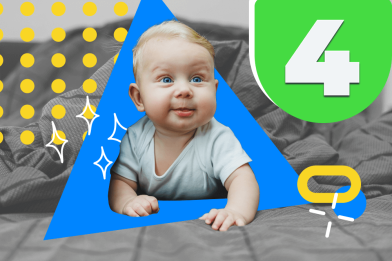1-Month-Old Baby: Milestones, Growth & Development

Celebrating the remarkable developmental milestones achieved by your one-month-old baby sets the stage for a journey of growth, exploration, and joy in the first year of life.
The first month of a child’s life is as important for the parents as it is for the child. The newborn is getting used to this world, and parents are getting used to taking care of their new little family member. Having adapted to the new reality, parents start worrying about the milestones of their child’s development. This includes lots of questions about the 1-month-old baby, whether they are growing in the right way, and whether they are in good health.
In this article, we have gathered the most essential elements that make the parents of a newborn worry during this pretty difficult, but very interesting time, along with some important safety tips.
Contents:
- Physical Development
- Feelings and Emotions
- Tips of a Doctor
- Frequently Arising Problems and Their Solutions
- When Should You Consult a Doctor?
- How to Contribute to the One-Month-Baby Development: Tips for Parents
- FAQs
Physical Development
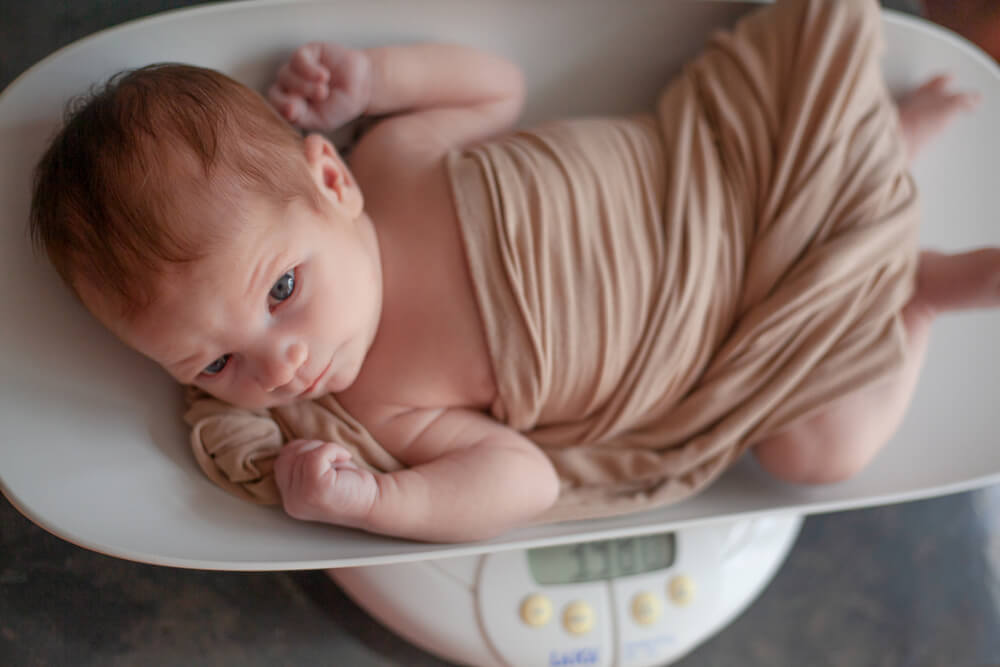
Prostock-studio/Shutterstock.com
It is important to remember that babies with premature birth cannot strictly follow all of the development steps, and this is normal. They will catch up on everything right on time. As a rule, premature babies need an extra month to catch up with children of the same age.
Height
Do not be alarmed if the child noticeably loses weight in the first days of their life. Babies are born with excess fluid and typically lose about 10% of their weight at birth. After that, the baby will be steadily gaining body weight. On average, in a month, a child gains 600 grams in weight and grows by 3 cm.
According to WHO, the average weight of an infant also depends on the sex of the child. As you can see from the baby growth chart below, the average weight of a baby and weight gain from birth can vary significantly.
The average height and weight for children at the age of 1-month-old:
| Boys | Girls | |||||||
| Weight, kg | Height, cm | Weight, kg | Height, cm | |||||
| Age | Average | The norm | Average | The norm | Average | The norm | Average | The norm |
| Newborns | 3,300 | 2,800-3,800 | 49,5 | 48-51 | 3,500 | 3,000-4,000 | 50,4 | 48-52 |
| 1 month | 4,100 | 3,500-4,600 | 53,5 | 51-56 | 4,300 | 3,600-5,000 | 54,5 | 52-57 |
⠀
What is important is not the birth weight of the baby, but rather how consistent the weight of the baby is with regards to the pregnancy term.
Don’t panic if your child is a little under or overweight according to baby growth charts. It is important that your baby grows and gains weight at a healthy rate. This should be monitored by a doctor or your regular healthcare provider, hence it is better not to use the children’s scales at home, for the sake of the mother’s peace of mind. In addition, a specialist will also pay attention to such important indicators as the circumference of the head and chest, during a routine doctor’s appointment.
Average head and chest circumference sizes in children:
| Age of the child | Head circumference, cm | Chest circumference, cm |
| Newborn | 33-36 | 32-36 |
| 1 month | 35-38 | 33-38 |
⠀
Physical Activity for 1-Month-Old Baby
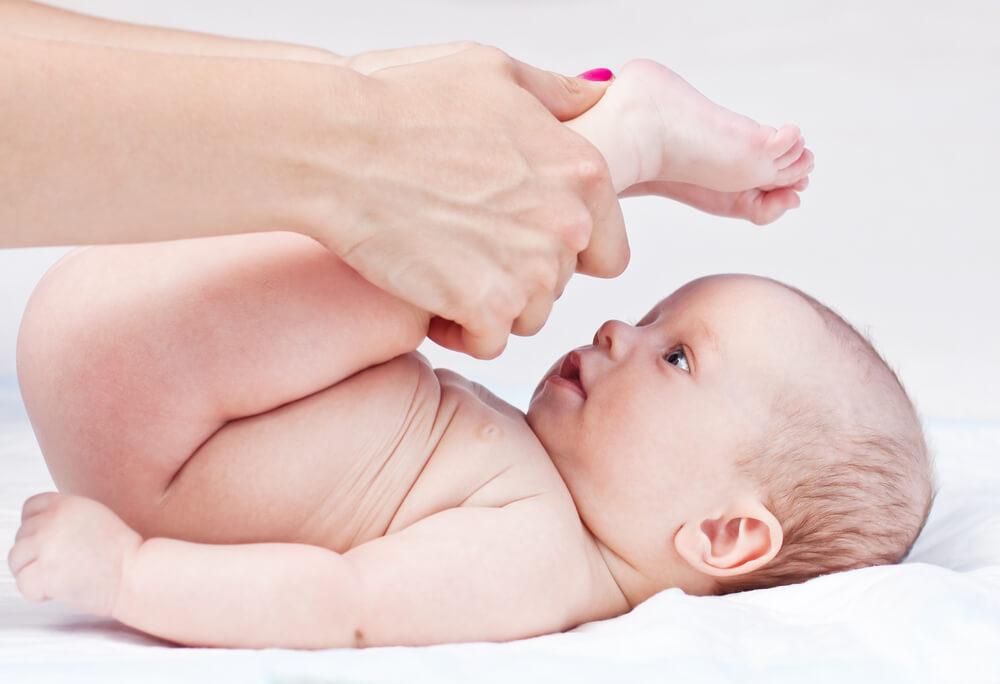
Prostock-studio/Shutterstock.com
The baby is born with a number of innate unconditioned reflexes. Some of them disappear over time, whilst others become the basis for the formation of others. In the first month of their life, babies are inactive, and the movement of their limbs is chaotic, with their arms being still much stronger than the legs.
A strong and healthy 1-month-old child has the following reflexes:
- Sucking. It allows the baby to be breastfed.
- Protective. When laid out on the tummy, the newborn raises and turns their head on its side.
- Holding. If an adult puts a finger in the baby’s palm, they will reflexively squeeze it into a fist.
- Supporting. If the baby is placed on a hard surface in the vertical position, they will take a couple of steps.
- Crawling. In a lying position on their stomach, the infant makes attempts to move in a crawling motion.
NB! Even though the child can already fully support their head, their neck is still not strong when lying on their stomach. Therefore, be sure to place your hand under your child’s head when picking them up to keep the baby safe.
Baby Sleep Schedule
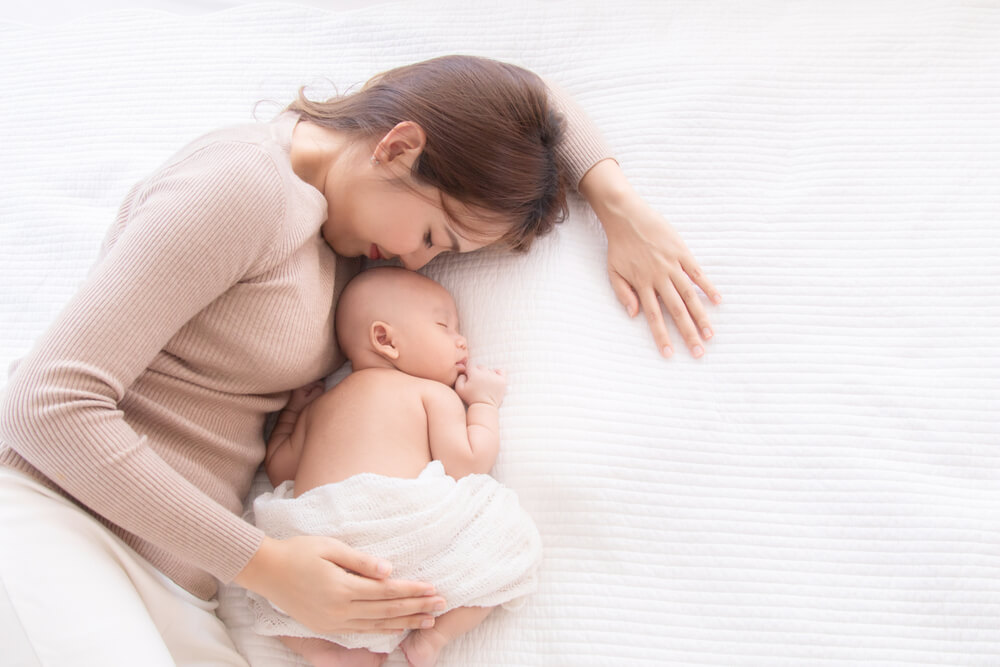
Prostock-studio/Shutterstock.com
Birth is hard work, both for the mother and the baby. Parents of children who have no sleep problems may even think that the baby only would also want to sleep at first. This is partly true as newborns sleep 15-16 hours a day.
However, not all babies can fall asleep on their own. A tired or overexcited child will need the help of a mother to fall asleep. Of course, it is impossible to teach a month-old baby to live according to a certain schedule, therefore, a clear daily routine will make life easier for both parents and baby. For instance, a strict sleep-eat-play regimen works for the majority of newborns. Over time, you will find that adhering to this lifestyle will become a set daily routine. Your healthcare provider can assure you with plenty of advice on helping your baby sleep, as well as safety tips in general.
Feelings and Emotions

Prostock-studio/Shutterstock.com
Eyesight: how far can a 1-month-old see?
One of the features of baby vision is blurred eyesight. The baby clearly sees objects and people at a distance of 20-30 cm, meaning that the baby sees the mother’s face best when being fed. Babies prefer high-contrast objects that are easier to see. However, this of course does not mean that you need to decorate their nursery exclusively in black and white shades.
A 1-month-old baby already begins to squint their eyes whilst trying to find the source of this light. Moreover, the baby starts displaying an interest in their relatives. At some point, they may even become more interesting than toys to them. Therefore, parents need to try to communicate with the newborn as much as possible, during the times when the little ones are awake.
Even as early as one month old, a baby may start to recognize and respond to familiar sounds, even recognizing some of the building blocks of language, such as the ‘cl’ and ‘tr’ sounds.
Most parents notice their baby first begins to make direct eye contact with them at around six to eight weeks of age, so this is one of the baby milestones that you’ll experience very soon!
If you notice that your child’s eyes are squinting a little in an attempt to focus, do not worry as their vision is not fully developed yet. However, if this continues for 3-4 months, it is better to consult a specialist.
Hearing

Prostock-studio/Shutterstock.com
The hearing of a newborn is not yet fully developed, however, infants can still recognize some sounds, for instance, the voices of their parents, which become familiar to them even when they are still in the womb. Babies also react to loud sounds. If it seems to you that the baby does not react to any sounds at all, make sure to inform your pediatrician or healthcare provider about it.
Taste and smell
At this age, babies, like all children, prefer a sweet taste, so they drink breast milk with pleasure. If their mother ate something spicy or sour on that day, the child may express dissatisfaction by crying. Newborns have a well-developed sense of smell. They like sweet aromas, and they can smell their mother’s milk from the first days of their life.
Feeding

Prostock-studio/Shutterstock.com
How often should a one-month-old eat?
In the first month of their life, a breastfed baby can be eating 8-12 times a day (approximately every 3-4 hours). Bottle-fed babies will need 6-8 meals. Some parents feed their babies on demand, while others stick to a schedule. In any case, when the baby gets hungry, you will know right away: they will start crying and looking for the breast or the bottle. Your healthcare provider is a great treasury of knowledge about this, so make the most of their knowledge and experience if you have any concerns.
How should a 1-month-old baby be fed?
Contrary to a number of tips, you should not feed a 1-month-old baby anything other than breast milk, formula, or a combination of both. Their digestive system is not ready to accept other kinds of food.
Do you need to give the child water?
Most doctors and healthcare providers recommend waiting up to six months and only then giving water to the body. The baby receives all of the needed elements and the right amount of liquid from the mother’s milk or the formula, under the circumstance that they are healthy and that they do not overheat.
A lack of wet diapers can be an indication of a problem, so it’s important to consult your healthcare provider if this is the case.
How many poopy diapers should a 1-month-old baby have in a day?
While this will vary from baby to baby, from newborn to age one month many babies will have about three to four bowel movements a day. From around one month old most babies will start to have fewer bowel movements a day—but a dirty diaper will still be a regular occurrence! If you’re concerned in any way about how many dirty diapers your baby has, speak with your healthcare provider.
Psycho-emotional development

Prostock-studio/Shutterstock.com
The development of an emotional connection with other people, especially with their mother, is vital for a newborn. During this period, an assessment of the stage of the infant’s mental development is extremely important. By the age of 1-month-old, a child should have the following skills:
- fix the gaze on a moving object for a short amount of time;
- focus on a stationary object;
- flinch at a sharp sound;
- listen to the voice of an adult;
- smile back;
- catch the sound of a bell;
- look for a source of light;
- make the first sounds.
The first sounds of a newborn resemble grunting and represent a kind of warm-up before humming. Nevertheless, at this stage of life, babies have one basic communication method, which is through crying. This is the only opportunity for the child to say: “I want to eat!”, “I need to change the diaper”, “I’m tired”, “Something hurts.” Parents quickly learn to understand their baby and find ways to calm them down.
The baby also begins to smile at the age of 1-month-old. And if it hasn’t happened yet, expect the most charming smile of your life very very soon.
Tips of a doctor
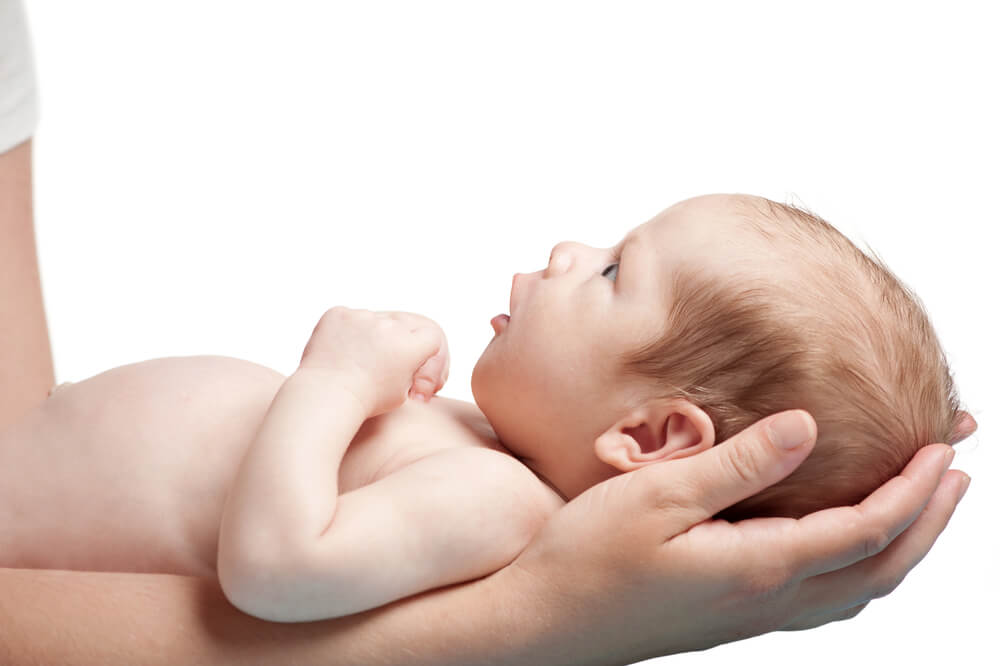
Prostock-studio/Shutterstock.com
A large number of modern pediatricians and healthcare providers have long been struggling with imposed stereotypes in terms of caring for children. The main rule is to rely on yourself and your common sense, and not allow others to hinder your everyday life with unsolicited advice. We have carefully selected the 3 main tips for taking care of newborns, which we present below:
Umbilical cord
The task of the parents is to let the rest of the umbilical cord get dried up in the air. In order to achieve this, it is important not to wrap up the child, but to have them be without lots of clothing at home. There is no need for any specific procedures with the umbilical cord.
Swaddling
There is nothing natural and useful in this process, according to new studies of healthcare providers and doctors. Not a single living creature in the world wraps their child after they are born, thus limiting their physical activity. Doctors advise to rather opt for comfortable clothes for newborns, whilst not being against clothes. The latter is even a cheaper option than a single-use diaper.
Diapers
Diapers are a way to make life easier for parents and the baby himself. Arguments about the health hazards of diapers are merely fiction.
Frequently arising problems and their solutions. When should parents be alarmed, and when not?

Prostock-studio/Shutterstock.com
As a rule, while mom or dad often start to worry about a certain issue, and while they consult with friends and look for answers on the Internet, the problem gets resolved on its own. Nevertheless, you need to be mentally prepared for minor issues, whilst keeping calm and not losing your common sense.
Below is a list of the most common problems faced by newborns in the first month of their life:
Constipation
Stool frequency in infants depends on the type of feeding. Formula-fed infants should have stool twice a day, whilst breastfed babies have it more frequently, up to 10 times per day. However, the latter may not have a stool for a couple of days, and this is also the norm.
It is easy to recognize the problem: if the child’s belly feels tough and they are swollen, the feces are hard, and the process of defecation itself hurts the baby, it means that the child experiences constipation. Speak with your healthcare provider as soon as possible about this.
In order to treat a delicate problem, it is important to determine its cause. Here are a few of such reasons:
- dehydration (especially in the heat, when the air is very dry);
- nutrition of the breastfeeding mother or a formula that is unsuitable for the baby;
- gastrointestinal diseases;
- rickets and hypothyroidism (lack of vitamins and minerals can lead to constipation from the first days of life);
- stress;
- colds or infections (a fever of the mother can also cause constipation).
Runny nose, nasal congestion and cough
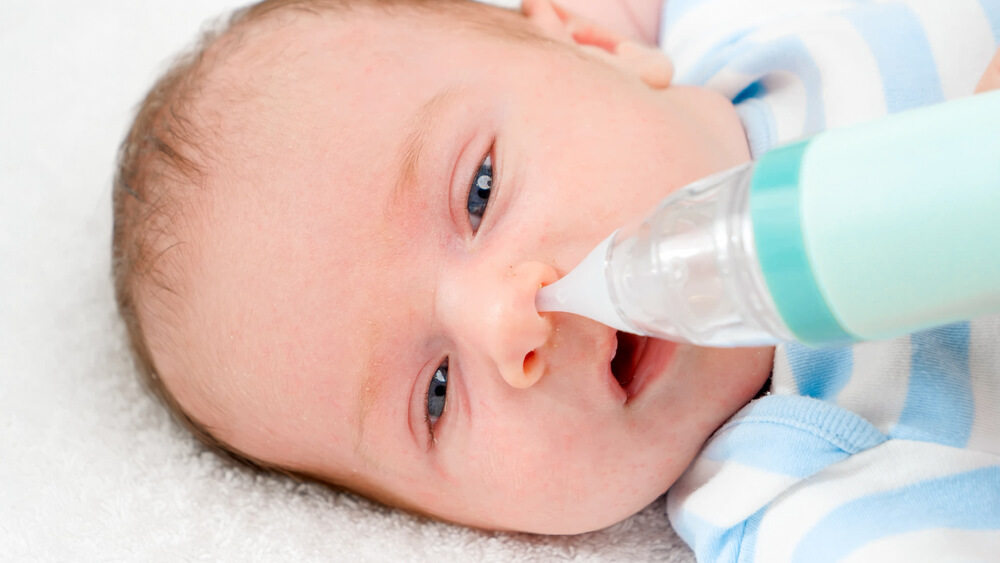
Prostock-studio/Shutterstock.com
A stuffy nose and coughing are common for babies. The first thing parents need to do is adjust the humidity levels at home. Your main helpers are frequent aeration of the room, wet cleaning, and a humidifier in the child’s bedroom. If this is not enough, see your doctor to rule out an infection or allergies.
Skin irritation
Almost every diaper-wearing baby experiences skin irritation and rashes at some point. The best solution here is prevention. Change the diaper on your child every 3 hours or more even often, if necessary. If irritation has already appeared, use a special cream when changing a diaper. Your healthcare provider may have some recommendations for you regarding which product to use. Most diaper rash is temporary and goes away quickly. However, here are some tips to avoid this problem:
- adjust the room temperature at home, it should not be higher than 22-23°С;
- try changing the brand of diapers or the products you use to wash your baby;
- pay attention to the child’s skincare—it must be organic and natural and must not contain any harmful chemicals and hormones.
Scales on the scalp

Prostock-studio/Shutterstock.com
In the first month, parents notice scales on the baby’s scalp. You don’t need to get rid of them on purpose. All you can do is put some natural oil on your baby’s scalp, such as argan or coconut oil, and brush out the bits of skin very gently. However, even if you don’t do anything regarding this matter, this issue will get resolved on its own by the time the child turns one year old.
Skin rashes
Many parents are surprised when a baby develops little bumps or a rash a couple of weeks after birth. This can be a reaction to fluctuations in hormone levels in their body. Rest assured that the phenomenon is temporary and the solution to this problem is gentle washing and avoiding lotions and creams on the affected area. Little pimples should not be touched so as not to cause an infection.
Stomach aches
Unfortunately, this problem is of a very frequent nature in newborns. In order to resolve it, to begin with, a breastfeeding mother needs to pay attention to her nutrition and exclude all foods that may cause bloating and gas. If the child is being fed a formula, you can try switching it. Some children feel better with a warm heated pad placed on the tummy during times when they feel uneasy, while other parents find it helpful to hold the baby upright to let the excess air out with burps. If the unpleasant feelings of the baby seem to be increasing, consult a doctor or healthcare provider, a professional will need to get your baby checked to exclude allergies, diseases of the gastrointestinal tract and neurological problems.
When should you consult a doctor?
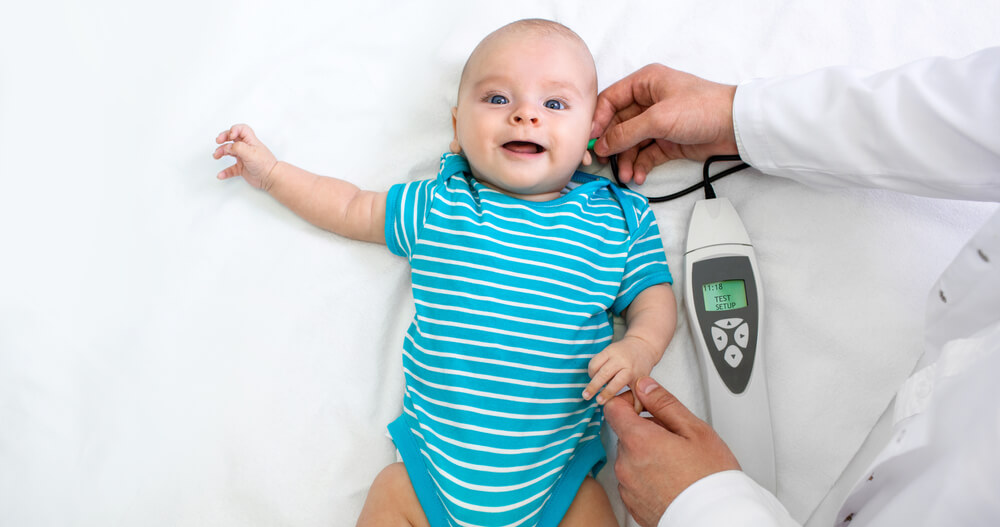
Prostock-studio/Shutterstock.com
As a rule, all of the above are temporary issues that go away on their own. However, there are some aspects to which you should pay special attention. A doctor’s consultation is necessary if you notice the following in your child:
- eats slowly and poorly;
- does not blink in bright light;
- does not focus and does not follow a moving object;
- slow and/or hardly moving their arms and legs;
- they are calm and do not cry, but at the same time their lower jaw is constantly trembling;
- does not react to loud sounds.
How to contribute to the one-month-baby development: tips for parents

Prostock-studio/Shutterstock.com
Health professionals stress that the time spent with parents is very useful and enjoyable for the baby. Here are some simple things you can do to help your baby grow:
- Play with your newborn. Through playing, the baby learns about the world around them.
- Develop their muscles: 1 to 5 minutes per day of playing on the tummy (tactile games, looking at contrasting pictures, rattles) strengthen the newborn’s muscles of the neck and abdomen.
- Provide the baby with a sense of security: your child must be sure that all of their main needs will be satisfied from the first days of their life.
- Talk to your baby, sing songs to them and smile more.
- Give your child a light massage: babies enjoy soft touches from the first days of their life.
Everyone knows that babies grow up way too fast for parents to enjoy this stage of their lives. If everything is fine with the health of the newborn, do not aim to draw up a strict checklist to monitor their development. Be there for them and enjoy every moment of their growing up.
FAQs
What will my baby be doing at 1 month old?
Having reached one month of life, most babies will be able to bring their hands up to their face, focus on a face, and have developed strong enough neck muscles to lift their head—briefly—during supervised tummy time. By one month old, around half of the babies will respond to loud noises in some way. At this point, some babies will also be able to smile in response to a smile, vocalize not just through crying, and have developed the neck strength and head control needed to lift their head 45 degrees during tummy time.
What not to do with a 1-month-old baby?
A 1 month old baby has only experienced 30 days of life so, whatever you may hear to the contrary, their developing digestive systems are not ready for solid food. At this age, breastmilk or formula are the only foods that a baby should be eating. Further, it’s still totally normal for very young babies to require late-night feedings, as well as feeding every few hours through the night. At this stage, it’s still too early to introduce sleep training techniques such as controlled crying, although establishing bedtime routines is a great idea.
How long should a 1 month old sleep at night without eating?
Very generally, a newborn baby can go around two and a half hours between feeds, through the day and night. By the age of one month old, your baby may be sleeping around ten to twelve hours at night, waking up intermittently to feed. While newborns may sleep for around 15-16 hours in a 24-hour period, most babies won’t start sleeping for a long stretch at night (around six to eight hours) without waking up to feed until around the age of three months. Speak to your healthcare provider for more information on this.
How much should a 1-month-old eat?
Your healthcare provider will be able to give you detailed advice on this but, in general, a 1-month-old baby should be eating around two to three ounces of breastmilk every two to three hours, or two to three ounces of formula every three to four hours.
The Next Stage of Your Child’s Development
The second month of your child’s development is just around the corner! We have prepared a detailed guide for this stage of development: click and read. Or bookmark the section with the child’s age development calendar from 1 month to 14 years and come back to it at any convenient time!
Photo on the cover image: Inara Prusakova/Shutterstock.com
Проверьте электронный ящик
















